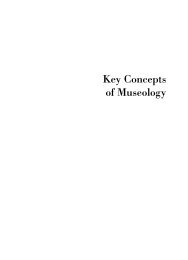ISS 25 (1995).pdf - The International Council of Museums
ISS 25 (1995).pdf - The International Council of Museums
ISS 25 (1995).pdf - The International Council of Museums
You also want an ePaper? Increase the reach of your titles
YUMPU automatically turns print PDFs into web optimized ePapers that Google loves.
MUSEUMS and COMMUNITIES: a powerful equation ...<br />
Maria de Lourdes Horta<br />
<strong>The</strong> theme <strong>of</strong> the <strong>1995</strong> rCOM's General Conference, Museum and<br />
Communities, seems to be as vast and varied as museums and<br />
communities in themselves. From the titles <strong>of</strong> the keynote speech and <strong>of</strong><br />
the four theme related speeches, announced in the programme for the<br />
Stavanger Conference, it is not difficult to trace the main approach<br />
which will govern the discussions: the political nature <strong>of</strong> the problem<br />
embedded in the subject theme.<br />
<strong>The</strong> "situation in Europe", as states the introductory text distributed to all<br />
rCOM members, appears to be the most pressing preoccupation, "in<br />
particular need <strong>of</strong> both reflection and action". While on the one hand<br />
political and chiefly economical agreements are trying to reduce the role<br />
<strong>of</strong> national boundaries, on the other hand the concept <strong>of</strong> national state is<br />
breaking up, splitting itself into new "national unities", which base their<br />
claims to existence and recognition on their cultural and historical roots.<br />
<strong>The</strong>se "national unities", claiming their rights on the basis <strong>of</strong> a feeling <strong>of</strong><br />
identity, built upon race, faith, history and traditions, could well be<br />
called "cultural unities", or "cultural communities": people who have<br />
important things "in common", common values, common beliefs,<br />
common social codes, common experiences, common histories, common<br />
ways <strong>of</strong> life, common expectations for the future. <strong>The</strong>re is nothing more<br />
. "museological" than this field <strong>of</strong> investigation, or this subject theme. It<br />
is, in fact, the main source <strong>of</strong> museum's history and <strong>of</strong> museum's life, and<br />
the only struggle one could find here would be the dispute with<br />
anthropologists and sociologists, and even with social-psychologists, on<br />
who has the biggest slice <strong>of</strong> the cake. Archaeologists would claim for<br />
themselves the deepest stratum <strong>of</strong> the field. But we never heard <strong>of</strong> George<br />
Henry Riviere throwing a bomb at Levi-Strauss' house.<br />
Where is the core <strong>of</strong> the problem we see now developing in the so-called<br />
"developed" countries, as well as in those not yet so "developed" ones?<br />
Why is it so "striking", as the introductory text to the Conference states,<br />
that "many young nations have adopted a motto stressing national unity"<br />
and why will the Director <strong>of</strong> the Papua New Guinea National Museum<br />
address the topic on the role <strong>of</strong> museums in creating a national unity?<br />
Perhaps the answer could be found in the speech <strong>of</strong> Mr. Ole Henrik<br />
Magga, pr<strong>of</strong>essor at the University <strong>of</strong> Oslo, who will talk about<br />
"<strong>Museums</strong> and cultural diversity: indigenous and dominant cultures". It is<br />
43
















